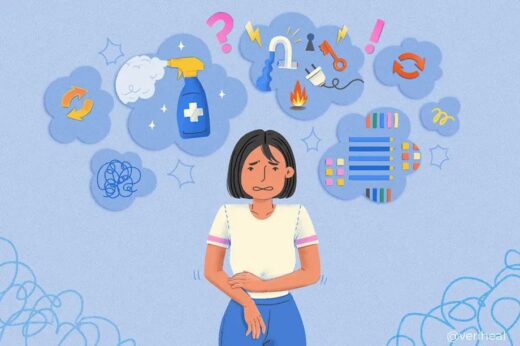Struggling with OCD?
Obsessive-Compulsive Disorder (OCD) is a mental health condition that affects millions of people worldwide. Despite its prevalence, OCD remains a taboo subject, often shrouded in stigma and misconceptions. In this article, we’ll delve into the world of OCD, exploring its symptoms, causes, and treatment options, as well as offering advice for those struggling to cope with this debilitating condition.
What is OCD?
OCD is a neurological disorder characterized by recurring, intrusive thoughts (obsessions) and compulsive behaviors or rituals that individuals feel compelled to perform. These thoughts and actions are often distressing, time-consuming, and interfere with daily life. Common examples of obsessions include:
– Fear of contamination or germs
– Fear of making mistakes or being imperfect
– Intrusive thoughts about harm or violence
– Unwanted memories or images
Compulsive behaviours may include:
– Excessive cleaning or handwashing
– Repeating rituals or routines
– Checking and re-checking locks or appliances
– Counting or repeating certain phrases
Symptoms of OCD
Individuals with OCD may experience a range of symptoms, including:
– Recurring, intrusive thoughts that trigger anxiety
– Compulsive behaviours or rituals that provide temporary relief from anxiety
– Preoccupation with orderliness, symmetry, or perfection
– Avoidance of certain situations or activities due to fear of contamination or embarrassment
– Significant distress or impairment in daily life
Causes of OCD
While the exact causes of OCD are not yet fully understood, research suggests that it is linked to:
– Genetics: Family history and inherited traits play a significant role in developing OCD
– Brain chemistry: Imbalances in neurotransmitters such as serotonin and dopamine may contribute to the development of OCD
– Environmental factors: Traumatic events, stress, and certain personality traits may also contribute to the development of OCD
Treatment Options
Fortunately, there are effective treatment options available for individuals struggling with OCD. These include:
– Cognitive-Behavioural Therapy (CBT): A type of talk therapy that helps individuals identify and challenge negative thought patterns and behaviours
– Medications: Selective serotonin reuptake inhibitors (SSRIs) and other medications can help reduce symptoms of OCD
– Exposure and Response Prevention (ERP): A therapy approach that involves gradually exposing individuals to situations or objects that trigger their obsessions, while resisting the urge to perform compulsive behaviours.
Living with OCD
For those living with OCD, it can be a daunting and isolating experience. However, there are steps you can take to manage your symptoms and improve your quality of life:
– Seek professional help: Consult with a mental health professional who specializes in OCD treatment
– Join a support group: Connect with others who understand what you’re going through
– Practice self-care: Engage in activities that bring you joy and help reduce stress
– Educate yourself: Learn about OCD and its treatment options to better manage your symptoms
Conclusion
OCD is a treatable condition that requires patience, understanding, and support. By acknowledging the stigma surrounding OCD and seeking professional help, individuals can begin to manage their symptoms and reclaim their lives. Remember, you are not alone in this struggle – there is hope for recovery and a life free from the grip of OCD.
References:
National Institute of Mental Health. (2020). Obsessive-Compulsive Disorder. Retrieved from https://www.nimh.nih.gov/health/topics/obsessive-compulsive-disorder-ocd/index.shtml
Royal College of Psychiatrists. (2020). Obsessive-Compulsive Disorder. Retrieved from https://www.rcpsych.ac.uk/healthadvice/conditions-and-mental-health-conditions/obsessive-compulsive-disorder
Websites:
Britmed Healthcare: https://britmedhealthcare.co.uk/
Nightingale Hospital: https://www.nightingalehospital.co.uk/
Top Doctors: https://www.topdoctors.co.uk/doctor/ahmed-el-missiry
You can also book, Contact us on WhatsApp 08009708017




